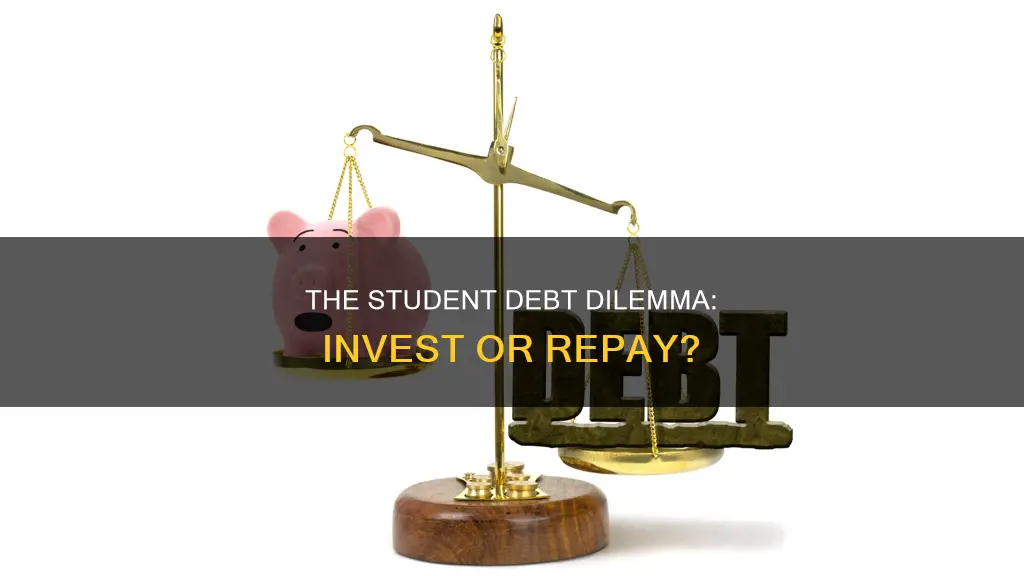
Whether to invest or pay off student debt is a common dilemma faced by many. While investing for the long term offers increased growth potential, it also comes with increased risk. On the other hand, paying off debt is a guaranteed return on investment and builds your net worth.
There are several factors to consider when deciding whether to invest or pay off student loans first. These include your overall financial health, the total amount of student debt and interest rate, the impact of monthly student loan payments on your budget, and the availability of consumer protections such as federal student loan forbearance or income-based repayment plans.
It is generally recommended to have an emergency fund of three to six months' worth of expenses saved up before deciding whether to invest or pay off debt. This will ensure that unexpected expenses don't increase your debt.
If you have high-interest debt, such as credit card debt, it is often advisable to prioritise paying this off first, as it can save you a significant amount in interest charges and may even free up cash for investing.
Another factor to consider is your risk tolerance. If you are comfortable with the fluctuations of the stock market, investing may be a good option. However, if the weight of debt is keeping you awake at night, prioritising repayment may be a better choice for your peace of mind.
Ultimately, the decision to invest or pay off student loans first depends on your individual circumstances and financial goals.
| Characteristics | Values |
|---|---|
| Emergency fund | Essential before deciding to pay off debt or invest |
| Retirement plan | Don't skip your company's retirement plan matches |
| High-interest debt | Pay off before investing |
| Investment return | Compare your expected investing return vs. how much interest you are paying |
| Student loan interest | If >10% APR, make repayment a priority |
| Student loan refinancing | Get in touch with a lender to see if you’re eligible for a lower interest rate |
| Federal student loans | Come with benefits, like Public Service Loan Forgiveness |
| Credit score | A low credit score can mean paying higher interest rates |
| Peace of mind | If debt is causing stress, there is nothing wrong with paying it down sooner |
| Risk tolerance | If you are comfortable taking the gamble, investing may be for you |
What You'll Learn

Weigh up your financial health, including other types of debt
Weighing up your financial health is a crucial step in deciding whether to invest or pay off student loans. Here are some key considerations:
Assess your overall financial situation
Start by evaluating your monthly cash flow. Do you have discretionary income left after covering your basic necessities, or are you living paycheck-to-paycheck? Understanding your financial landscape will help you make informed decisions about investing or debt repayment.
Create an emergency fund
Before deciding whether to invest or repay student loans, it's essential to have an emergency fund in place. Aim to save at least three months' worth of expenses to cover unexpected costs, such as car repairs, medical bills, or job loss. This emergency fund will help prevent you from increasing your debt if unforeseen expenses arise.
Prioritize paying off high-interest debt
Focus on repaying high-interest debt, such as credit card debt, before investing. Credit card debt often carries high-interest rates, making it more challenging and costly to pay off over time. By tackling it first, you can save money on interest and free up cash flow for investing or building your emergency fund.
Understand the basics of investing
Investing in the stock market or other financial instruments can offer higher returns than simply repaying low-interest student loans. However, investing also comes with risks. Understand that investments can fluctuate in value and that historical returns don't guarantee future performance. Consider your risk tolerance and investment time horizon when deciding whether to invest or repay debt.
Evaluate the psychological impact of debt
Debt can cause significant stress and anxiety, affecting your mental health and overall well-being. If the weight of debt is keeping you awake at night, it may be wise to prioritize repayment, even if the mathematical calculations suggest investing would be more beneficial. Your peace of mind and mental health are important factors in this decision.
Seek professional advice
Consider consulting a financial advisor or credit counsellor to help you make an informed decision. They can provide personalized guidance based on your financial situation, risk tolerance, and goals. Additionally, they can support you in creating a comprehensive plan to manage your debt and investments effectively.
Who Invests and Why?
You may want to see also

Compare your student debt interest rate to your expected investment return
When deciding whether to pay off student loans or invest, it's important to consider the interest rate of your student debt and compare it to your expected investment return. Here are some key points to keep in mind:
- Interest rates on student loans: The interest rate on federal student loans for undergraduates is currently 6.53% for the 2024-25 academic year. Graduate student loans and PLUS loans have higher rates, at 8.08% and 9.08% respectively. Private student loan interest rates can vary widely, typically ranging from around 4% to 17%, and are based on the borrower's creditworthiness.
- Expected investment return: The expected return on investments can vary depending on the type of investment. Historical data shows that stocks have generally provided long-term returns of over 9% annually. However, it's important to remember that investment returns can fluctuate and are not guaranteed.
- Comparing interest rates and expected returns: If your student loan interest rate is lower than your expected investment return, it may make sense to prioritize investing over paying off your student loans early. On the other hand, if your student loan interest rate is higher than any possible investment return, you may be better off focusing on getting out of debt faster.
- Other factors to consider: It's also important to consider your financial goals and priorities. If becoming debt-free is your top priority, you may want to put all your extra funds toward paying off your student loans early. Additionally, if you are enrolled in a student loan forgiveness plan or have a low-interest rate on your student loans, investing may be a more attractive option.
In summary, comparing your student debt interest rate to your expected investment return is a crucial step in deciding whether to pay off student loans or invest. It's important to weigh the potential savings from paying off high-interest debt against the potential gains from investing. Other factors, such as your financial goals and risk tolerance, should also be considered when making this decision.
US Investment Trends: Where's the Money?
You may want to see also

Consider the psychological benefits of being debt-free
Being debt-free can have a significant positive impact on your mental health and overall well-being. It alleviates stress, anxiety, and worry, allowing you to feel more relaxed and improving your sleep quality. The constant emotional toll of debt can affect your motivation and lead to a general feeling of unease, so becoming debt-free can boost your self-esteem, confidence, and sense of control over your life.
Debt-free living also improves your physical health. Stress can negatively impact your cardiovascular health and contribute to various diseases and disorders. By reducing stress, you can help alleviate or prevent these conditions and improve your physical well-being.
Additionally, being debt-free improves your work-life balance. You will no longer feel the need to work extra hours or take on additional jobs to pay off your debt. This improved balance will give you more time to focus on meaningful work and activities that inspire you, enhancing your overall quality of life.
Financial freedom is another benefit of being debt-free. You will have more choices about how to spend your money and make investments to grow your wealth. This sense of financial freedom can also improve your relationships, as financial stress is a common reason for divorce and breakups. Being debt-free can improve communication and trust between partners and set a positive example for children, encouraging responsible spending habits and a healthy relationship with money.
Finally, being debt-free can broaden your horizons and increase your optimism. With a large chunk of your income no longer going towards debt payments, you will have more opportunities to pursue new projects, start a business, grow your family, or save for retirement.
Target: Invest Now or Miss Out?
You may want to see also

Prioritise an emergency fund before investing
It is recommended to have an emergency fund before deciding whether to pay off student loans or invest. This fund should ideally be three to six months' worth of expenses saved up for emergencies. Even $1,000 or $2,000 is a good start. This will ensure that unexpected expenses, such as car repairs, medical bills, or job loss, do not increase your debt.
The emergency fund should be easily accessible and liquid, which is why savings accounts are the recommended vehicle for it. While it may be tempting to invest your emergency fund to grow your balance faster, it could be disastrous if your assets lose value by the time you need to make a withdrawal. You could potentially lose the money you invest, especially if the value of your assets falls below what you purchased them for.
Additionally, you'll owe taxes when you need to make a withdrawal from a taxable brokerage account. Profits made from selling assets you've held for a year or less are subject to a short-term capital gains tax, which is usually the same as your regular income tax rate. If you sell assets you've kept for over a year, you'll pay a long-term capital gains tax of between 0% and 20%.
Instead of investing your emergency fund, consider putting it into a high-yield savings account. This will allow you to grow your balance slightly faster, even if you aren't making regular contributions, and you'll know that the value of your money won't fluctuate.
Why Invest in Entertainment?
You may want to see also

Take advantage of any employer matches
If your employer offers a retirement plan with matching contributions, this is a significant benefit that you should take advantage of. According to Vanguard's 2021 How America Saves study, 59% of employers offered matching contributions in 2019, but nearly 40% of employees missed out on the full match. Failing to make enough contributions to qualify for the full match means you're losing out on money that is part of your compensation package.
If your employer matches your retirement savings, you should prioritize taking advantage of the full company match over paying down debt. This is essentially free money, so if your debt payments are too high to allow you to take advantage of the match, it's time to review your budget.
The median employer match for a 401(k) is 3% of your salary. This means if you invest 3% of your salary into your 401(k), your employer will invest another 3%. The money is tax-free until you pull it out in retirement.
For example, if you earn $50,000 per year and contribute $3,000 (6% of your salary) to your 401(k), your employer will contribute $1,500 (3% of your salary) toward your retirement. That's an additional $1,500 in your pocket, which you would otherwise be missing out on.
Beginning in 2024, employers will be able to count qualified student loan payments as elective deferrals toward a retirement savings account. This means your employer could match your student loan payment and deposit that amount into your 401(k), allowing you to grow your retirement savings without shelling out extra dollars.
Invest Wisely in People, Shape Your Legacy
You may want to see also
Frequently asked questions
It depends on your financial situation, but generally, if you can earn more on your investments than your debts are costing you in interest, then investing is a good idea.
Investing is a way to set money aside for the future, ideally in an investment vehicle that will grow in value over time.
Debt can be a burden and paying it off can give you peace of mind. It can also reduce your monthly expenses, giving you more financial freedom.
Consider your overall financial health, including your budget, emergency fund, and the interest rate on your debt. You should also think about your feelings and risk tolerance. If you are losing sleep over your debts, then you may want to prioritise paying them off.







